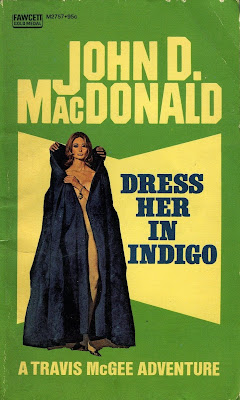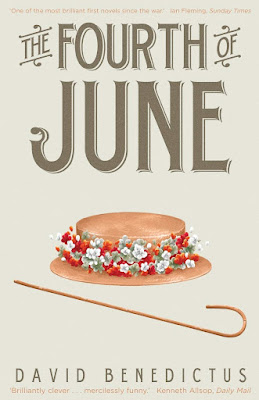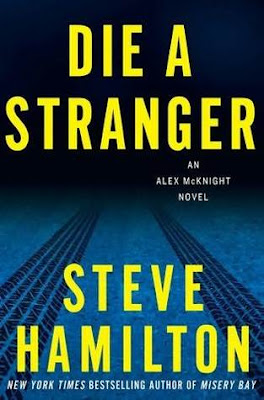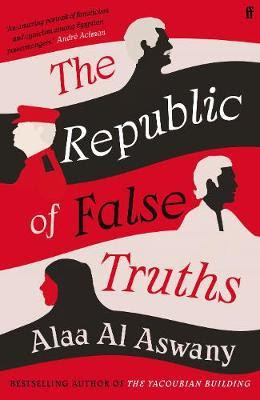Sometime in the 1970s one of my first forays into crime fiction came via John D. MacDonald's series about Travis McGee, a Florida-based "salvage consultant" who helps people recover money or property they've lost due to theft, embezzlement, blackmail or a slick con. McGee keeps half of what he recovers as a fee. In truth, McGee is an adventurer/private detective who just as often comes to the aid of friends as he does clients. The twenty-one McGee novels were written from 1964-85, were very successful at the time, and certainly remain popular with critics and contemporary crime writers. I read them in publication order way back when, and I recall enjoying them very much. Up to a point. I remember that as the series wore on, the book's became less about crime and more about sex. There's nothing wrong with sexy crime novels, but my impression at the time was that MacDonald was letting his freak flag fly under the guise of crime fiction.
The McGee novels were recently reissued, complete with glowing introductions by writers such as Lee Child and Carl Hiaasen, so I decided to give MacDonald another try and see how he'd aged. First off, here's what's still good about MacDonald: he writes about Florida and the destruction of its environment with a prescience and passion that still burns brightly. MacDonald saw with awful clarity that Florida was being raped and pillaged by property developers and politicians, and if nothing else he could claim to be the first "eco-novelist." In relation to this, MacDonald is also a fine writer when it comes to describing the outdoor life. His descriptions of the natural world, life on the ocean, fishing, the joys of sailing, all have a freshness and muscular poetry that makes them timeless. Lastly, the plots of the McGee books have a pleasing variety. Murder always figures into the stories, but there's also some complex con or swindle going as well, and the settings for the novels frequently shift away from Florida.
But here's where things get wonky with the McGee novels. It turns out I wasn't misremembering the obsession with sex in the books. It's fair to say that MacDonald was using the McGee books to air his sexual anxieties and fantasies. But where to start? One theme that runs through all the books is the idea of sexual humiliation and/or enslavement. Various characters, often quite minor ones, are given back stories in which it's revealed that their sexual partner either made them feel so sexually inadequate they had nervous breakdowns, or their partner was so good in the sack they became their sexual slaves. Darker Than Amber has barely got under way before we're hearing about a woman who fetches up on McGee's doorstep after being sexually humiliated by her husband. After some hands-on sex therapy from Travis, the woman is made whole again and is gone from the story. Almost every book has several asides along these lines, and all kinds of throwaway characters only make appearances in the stories (so it would seem) so that MacDonald can dwell on their sexual prowess, particularly their ability to gain a psychological hold over another man or woman simply through their sexual skill or appetite.
Another theme is voyeurism. In two of the novels McGee lurks outside bedroom windows listening to the people inside having sex, and on several more occasions he looks through pictures taken surreptitiously of people making love, which has to count as voyeurism by proxy. In fact, I don't think there's a single novel that doesn't have some scene of mild or major voyeurism.
MacDonald often presents sexual relationships as a kind of infection, something that the mind might resist but the body cannot. When he gets down to describing the nitty-gritty of people fucking, MacDonald takes the view that we're helpless slaves to our body's sexual triggers and desires. In Dress Her In Indigo McGee falls into a brief (and irrelevant) affair with an English aristocrat. McGee is initially a helpless victim of her sexual acrobatics, seemingly forced to have pleasure against his will. Our hero eventually manages to turn the tables and make the aristo purr with pleasure, which, oddly enough, seems counter to her wishes. The whole sub-plot is profoundly bizarre. The same novel also features an "incurable" lesbian and a gay man. Both characters are described as having the ability to turn straight people gay. McGee sees the gay man, Bruce Bundy, taking a straight man under his wing and confidently surmises that within a few months the hetero will be speaking with a lisp.
MacDonald's view that we have little control over our sexual selves takes a darker, more disturbing turn in Bright Orange for the Shroud, in which a woman is repeatedly raped one night by a brutish redneck. The rape scene is horrible enough, but what's worse is that MacDonald then tells us that because the woman's husband hadn't been satisfying her in bed, her body, if not her mind, couldn't help but enjoy the rape. Here's how MacDonald describes it:
"But he was so damned sly and knowing, so crafty and patient that each time, even the last tine, he had awakened the traitor body so that while the soul watched, the body gasped and strained to hungry climax, to dirty joy, grasping powerfully."
Yes, dear old John D. had a taste for rape. Indeed, the villain of the first McGee novel, The Deep Blue Good-by, is a notable serial rapist. It's not a subject that's as front and centre as his other sexual obsessions, but it's a subject that recurs throughout the series. In Cape Fear, MacDonald's most famous non-McGee book, rape and the threat of it is the focus of the novel. Max Cady, the villain of the piece, is put in prison for rape by the novel's hero, Sam Bowden, who, in yet another of MacDonald's voyeuristic moments, actually witnesses the rape. The rest of the novel features Cady raping his ex-wife, and threats of rape against Bowden's wife and daughter. Given that the novel was written in 1957 (originally called The Executioners), one can only imagine how much more sexually violent and explicit it might have been if written ten years later when MacDonald was peaking in popularity.
And getting back to the Bruce Bundys of the world, there's a subtle but definite vein of homoeroticism running through the McGee novels. MacDonald sees to have a thing for bears, and I don't mean the kind who steal picnic baskets. In gay culture, large, hairy, masculine gay men are known as "bears," and, as it happens, McGee's best friend and sidekick, Meyer, fits that description to a T. Meyer's chunkiness and hirsuteness is obsessively mentioned by MacDonald, who frequently describes him as looking like a bear or ape. Meyer's not the only hairy hunk McGee meets up with. Here's how McGee/MacDonald describes Boone Waxwell, the redneck rapist:
"He was barefoot, bare to the waist. Glossy black curly hair, dense black mat of hair on his chest. Blue eyes."
And a bit later:
"He peered up at us through lashes I had not noticed before, dense and black and girlishly long."
Hmm. Travis certainly has an appreciation for a well-furred foe. And Waxwell isn't the only fit, hairy man McGee will meet on his various adventures. Interestingly, Waxwell meets his maker when he leaps off a boat into shallow water and impales himself up the ass on a submerged tree root. Paging Dr. Freud. And then there are McGee's girlfriends. Each novel has Travis falling into bed with one or two women, but one characteristic almost all of them share is a certain mannishness. McGee's women are usually described as fit, athletic, solid, or muscular. No svelte, willowy femmes for Trav. In one of the later novels, The Dreadful Lemon Sky, McGee and MacDonald's taste for butch women becomes more explicit:
"There was big tall lady behind the counter in the office. She had very short black hair and strong features...She stood about six feet high, and though the face was strong enough to look just a little bit masculine, there was nothing masculine about the legs or the way she filled the T-shirt."
The masculinity of Travis' women often goes beyond the physical; they sometimes even sound like men. In Pale Gray for Guilt McGee's love interest is Puss Killian (introduced to us as "a big, stately, random redhead"), and what's striking about her is that she means more to Travis than most of his companions and through her speech and hearty sense of humor, you're left with the indelible impression that you're listening to a man.
MacDonald began his career writing all kinds of pulp fiction in the 1940s and '50s, and a certain amount of sex was the sizzle needed to ship product in those days. The '60s saw pulp fiction get even more sexually explicit, so from that point of view the McGee books are simply surfing the wave of sexiness that helped define that decade. What sets MacDonald apart from his peers is the sheer amount of sexuality in his McGee novels. In novels like Bright Orange for the Shroud and Dress Her In Indigo it feels like the crime plots end up taking a back seat to discussions and depictions of sex. And yet MacDonald stops short of becoming a porn writer because it's clear he's both fascinated and terrified of sex. A porn writer enjoys what he's writing about. With MacDonald you get the impression he can't stop talking about something that scares the crap out of him. What's intriguing is what caused this terror. At times he comes across as a man with horrendous performance-anxiety issues, and at others he reads like a deeply-closeted gay man whose constant focus on heterosexuality is a way of distracting himself from his own truth. I'll go out on a limb and opt for the latter explanation. If there's one overriding theme in the McGee novels, it's that people can't fight and/or are betrayed by their true sexual natures. MacDonald seems to find that a terrifying prospect, and it's easy to conclude that the McGee novels were his way of articulating his painfully repressed sexuality.
All in all, I can't say that the McGee books have stood the test of time. He has a poor ear for dialogue, his attempts at humour are ham-fisted, and he gets downright silly and cranky on the subject of hippies and rock 'n roll. But if you're looking to do a master's thesis on, say, sexual anxiety in 1960s crime fiction, MacDonald's a limitless resource.







